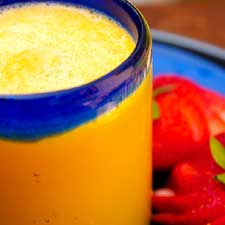Juice Diet

Fasts, which typically last a single day to five days, substitute fruit and vegetable juices in place of all solid foods. These juices must be all-natural, free of sugar, salt and additives. Proponents recommend using organic juices as a source. Choose from celery, carrot, kale, apple, pineapple, cabbage and spinach juice. Avoid citrus juices such as grapefruit and orange. Juices should be diluted with distilled or mineral water. Prepare juices fresh or purchase the freshest juices you can find.
Weight loss happens as a result of extremely low calorie levels from the fast. Much of this loss is water weight, weight which returns once followers revert back to their normal eating habits. Experts recommend drinking a lot of water while fasting. They also suggest getting plenty of rest. Some less restrictive fasts allow people to eat fruits and vegetables, or one meal a day in the afternoon. Juice fasts may change in rigidity.
Since the diet is so low in protein, carbs, fats and important nutrients, side effects of long-term fasts include weakness, lack of energy, headaches and disorientation. These are a result of the toxins being flushed out of the system. When following a juice fast, it is recommended that you are under the care of a physician.

